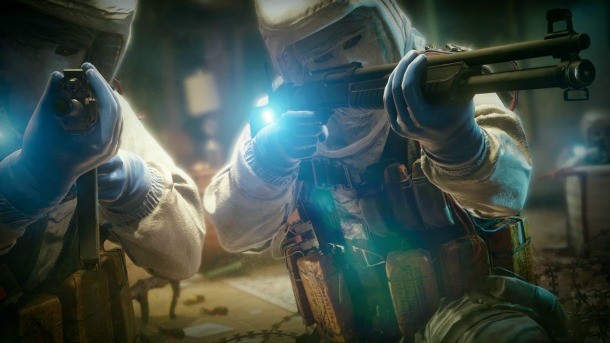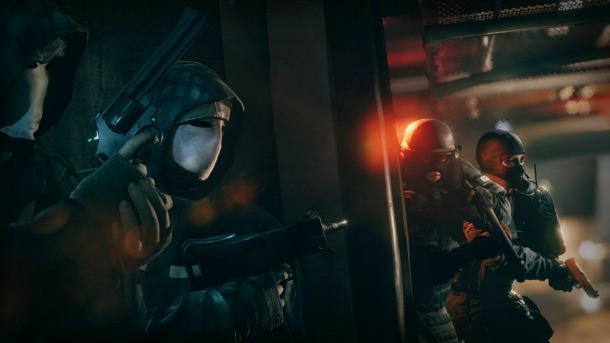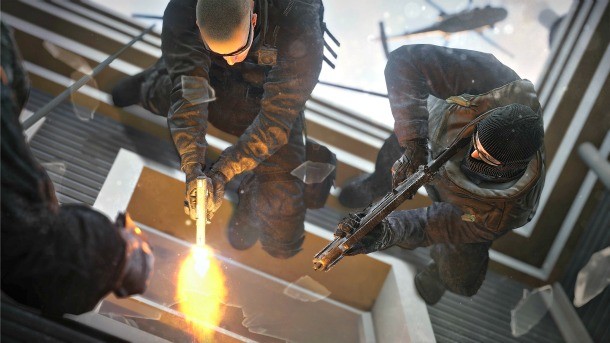Please support Game Informer. Print magazine subscriptions are less than $2 per issue
You Are Being Watched: The Terrifying Paranoia of Rainbow Six Siege

I crouch in a dark corner of the parlor. My teammates are restless. They should be. A few minutes ago a camera on wheels rolled into our little hideout and saw each and every one of us, as well as the hostage we're guarding. We've erected steel walls, placed explosive traps all along the perimeter, and have our guns trained on every single entry point we can conceive of. They know where we are and they'll be here any second. "We're so screwed," one of my teammates barks over the line. He's probably not wrong.
Suddenly the west wall goes down, smoke rises from the mouth of a grenade and bullets pour into the room, killing two of my pals. One of our foes' stray rounds tears through the hostage and just like that, in a matter of seconds, the matter is decided in our favor.
Rainbow Six Siege is a different kind of game.
From a distance, it's easy to look at it and assume the series has abandoned its hardcore tactical origins and has taken to aping the more simplistic, but immensely enjoyable team-based gameplay of Counter-Strike, where matches are often won by who has the quickest draw. This isn't the case. In reality, Siege is refreshingly methodical, less dependent on twitchy reflexes and more on how adept you and your teammates are at obtaining and using information.
It's the perfect game for the surveillance age. Fiction concerning the ethics of monitoring populations for the public good has become a common theme in the past 15 years, serving as a crux of films like Zero Dark Thirty and Eagle Eye. This unease has seeped into games as well; Metal Gear Solid, Republique, Deus Ex, and Watch Dogs all have protagonists who use information, often extracted from hard drives and hacked security cameras, to combat their foes, whether they're corrupt governments or gangsters. These games typically tackle such distinctly post-9/11 anxieties in their writing and not necessarily in the nitty-gritty of their mechanics, trying to make you feel the paranoia of an era where people are concerned about the government listening in on their cellphone conversations or that a database with their credit card numbers in it has leaked onto the internet with story in lieu of gameplay.

Siege flips that. There's no story in the game to speak of, outside of some terrible training missions, but each moment of every match helps build its own tale about either overcoming or succumbing to violent paranoia. Every session begins with a sequence where the attackers send in drones to search the premise for their target room while defenders scramble to build up fortifications and, if they have their wits about them, lead the drones away from the target room with red herring traps. It's often in this segment that the game is decided. If a defender can sneak a drone camera into the target room and hide it between books on a shelf or beneath a couch, there's a good chance the attackers will win if the team has experienced players that know how to overcome the combination of defenses and are in constant communication with one another. Hope isn't lost for the defenders if they're discovered early on, though, since they also have access to security cameras littered around every level to spy on the attackers thus have precious information, like what classes and breaching devices the attackers have, they can use to turn the tide of battle.
A sense that you're being watched pervades nearly every moment of each game (even when you're not). Every offensive and defensive action you can take has layers to it, ramping up the tension because you're never sure if what you're seeing is the whole picture. For example: a group of attackers bunching up against one of your walls and firing into it might mean that the whole team is right there, ready to breach and try to take you head-on. However, it could also mean that there are only two people shooting through the wall and the rest of the team is grouping up above or behind you, getting ready to breach and flank. Like chess, much of your performance in Siege depends on how skilled you are at seeing all of your opponents' possible moves and then quickly acting on those calculations...as a team, which is easier said than done.
Audio and visual cues can help you make your choices but more often than not they cloud your judgement. Hearing footsteps signals that an enemy is nearby but you're never going to know precisely where they are until you see them or they ambush you. Poking holes into the walls of your manmade fortress gives you a place to shoot and surprise enemies as they near the target room but more often than not it's of little tactical use, offering a glimpse of your opponent before they scuttle out of sight after poking at your defenses. The game works best in these instances, in the agonizing build-up to the inevitable, explosive face-off that paints the walls in blood.

Shootouts are nerve-wracking and cathartic conclusions to that build-up thanks to the destructibility of the environment and the low visibility caused by smoke grenades and flashbangs. The bullet that kills you is often passing through walls and barricades. Gunfire exchanges, instead of being long, drawn-out affairs, are often chaotic and disturbingly brief: a burst of lead that slaps a body and sends it slouching to the ground quietly.
When it's firing on all cylinders and you have two experienced teams squaring off against one another, Siege exists in an exhilarating freefall. No matter how high you build your walls or how detailed your attack plan is, enough pieces are moving around that no strategy is ever a sure bet and you're never standing on solid ground. It's this scary unpredictability that makes the game so fresh and worthy of attention, even if getting to the point where it plays as intended can be a chore. Hopefully Siege will retain a strong enough community so that its unique paranoia-laced tactical gameplay has some longevity to it instead of joining the ranks of promising but quickly forgotten multiplayer titles. A game that brings this kind of frightening innovation to its genre deserves a better fate.
If you're playing Rainbow Six Siege, be sure to check out our tips guide. It might keep you out of sight and alive just a bit longer.










